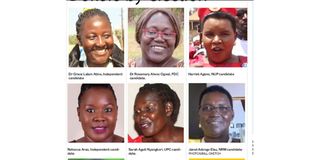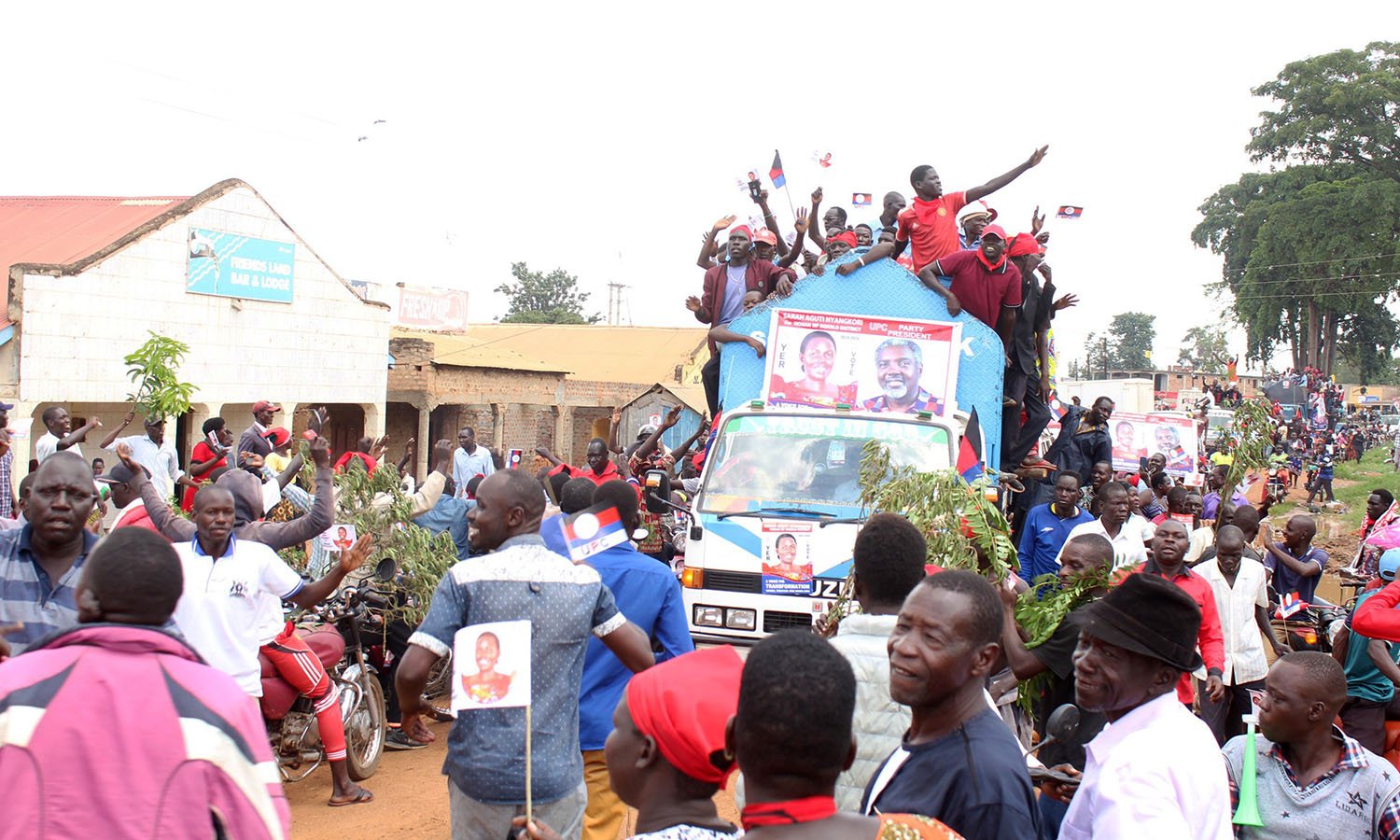Key issues shaping Dokolo by-election

What you need to know:
- Seven candidates are competing for the slot that became vacant following the death of Cecilia Atim Ogwal on January 18.
On March 21, residents of Dokolo District will head to the polls to elect their Woman Member of Parliament.
The Electoral Commission (EC) has nominated seven candidates to compete for the slot that became vacant following the death of Cecilia Atim Ogwal on January 18.
Those nominated include her daughter, Dr Rosemary Alwoch Ogwal, running on FDC ticket, Ms Janet Adongo Elau, the National Resistance Movement (NRM) candidate, and UPC’s Sarah Aguti Nyangkori.
Both Ms Adongo and Ms Aguti lost to late Ogwal in the 2021 parliamentary election.
The EC also cleared Dr Esther Akullo Obot Otada, Ms Rebecca Arao, and Dr Grace Anna Lalam, all independent candidates, and Ms Harriet Ageno of National Unity Platform (NUP) to run for the seat.
But as the district prepares for the polls, residents list several unresolved issues, which they think their new legislator should address.
They are; a broken education system coupled with a high cost of living, hunger, poor road network, shortage of drugs, and inadequate health workers in public health facilities.
Residents say the most critical problem is the lack of government support.
“The little resources that the government is supposed to send to the district do not seem to come on time. I keep hearing them [duty bearers] saying they are not able to perform their duties because resources are not there. They say they were supposed to be given Shs1b for roads but remittance is poor,” says Mr John Baptist Okello-Okello, the former district chairperson.
“So, you find the roads are not done, and if the road network is poor, it cripples access to all social services. I don’t know the situation in other districts but here in Dokolo, roads are collapsing. The maintenance has failed, and the district leaders keep on crying they have not been provided with the resources,” he adds.
Also, the issue of drug stockout has remained a big problem in the area.
According to voters, almost all health facilities in Dokolo always run out of essential drugs.
“Yes, we used to have a shortage of drugs in our government health facilities but now, the situation seems to have gone worse,” the former district chairperson adds.
Ms Lillian Oluk, a resident of Okwalongwen Sub-county, says inadequate health workers and a shortage of essential drugs have affected access to effective healthcare services.
“At times when you fall sick and visit the government health facility in our area, they tell you there are no drugs. Instead, health workers refer you to private health facilities where drugs are very expensive,” she says.
To improve health service delivery, Ms Esther Apio, a member of the Village Health Team (VHT) at Awelomer Village in Okwalongwen Sub-county, implores the new MP to lobby for the upgrade of Dokolo Health Centre IV to a district hospital.
“At times when an expectant mother has complications during labour, our lower health facilities may not be able to handle such cases and we end up losing either the mother or newborn or both,” she says.
Over the years, there has been a remarkable improvement in the education system in northern Uganda despite several challenges.
However, local leaders and residents say the quality of education in some schools in Dokolo has dropped significantly.
According to the 2014 National Population and Housing Census (NPHC), 5,574 (15.7 percent) males aged 18 years and above are illiterate in Dokolo, while 19,160 females of the same age bracket (45.8 percent) are illiterate.
Mr Okello-Okello says Dokolo is struggling to provide quality education to children due to a high teacher-pupil ratio.
Indeed, Dokolo with a staff ceiling of 1,118, had a shortfall of 374 teachers to provide services to its 60 schools, according to a Community Score Card (CSC) administered by the Apac Anti-Corruption Coalition, a non-governmental organisation, in 2019.
Almost four years down the road, the situation has not changed, according to the former district chairperson, who says the number of children enrolled in government schools is not proportional to the number of teachers.
Mr Joseph Amyedu, a resident of Dokolo Town Council, says there is also a need for the government to increase the number of teachers to help the learners.
“More government schools should be established and qualified teachers recruited to improve the quality of education,” he says.
But the chairperson of Dokolo District Service Commission, Mr Okello-Okello, wonders whether the seven aspirants in the queue to replace the late Ogwal will perform any miracle.
“I don’t know whether these young ladies who are trying to go to Parliament will address those critical issues but I think even people who have been in Parliament already should take these issues very seriously,” he says, adding that whatever little budgetary resources the government plans for the district should come.

Dr Esther Akullo Obot, Independent candidate
“During my period, it wasn’t a lot of money but it was coming on time. So, you could do something. Now they say a lot of money is there. Whether it comes and it’s wasted, I don’t know but it seems to be a general problem in the country,” he says.
Poverty level
At least 1,416 (4.1 percent) households in Dokolo have members aged five years and above unable to afford two meals a day. Only 1.7 percent (604) households in the area own a television, while 21,732 households (62.2 percent own a bicycle.
At least 1,039 households (3.0 percent) rely on a community announcer as their main source of information because they don’t own radios.
This is according to the 2014 national housing census.
WHAT THEY SAY
Dr Lalam Atine, Independent:
“The quality of education in Dokolo District is appalling because last year, we were the fifth last in the whole country, but once elected, I will ensure that the quality of education in Dokolo is improved. Since agriculture is the backbone of Uganda, I shall introduce the system of modernised agriculture and distribute tractors to the farmers to improve their livelihoods.”
Dr Alwoch Ogwal, FDC candidate: “I want to work with the government to improve the performance of students going to government schools. Students who qualify or who go there should be able to have minimum academic qualifications.”
John Baptist Okello-Okello, the former district chairperson: “The little resources that the government is supposed to send to the district do not seem to come on time. I keep hearing them [duty bearers] saying they are not able to perform their duties because resources are not there. They say they were supposed to be given Shs1b for roads but remittance is poor.”
MPs’ roles
Catalysts
Whereas voters expect a lot from their representatives in Parliament, there are just four specific roles of Members of Parliament.
For instance, members debate and pass laws through which the institutions of government endeavor to guide the country’s process.
Additionally, they analyse and pass or approve the national budget every financial year.
They further represent their constituents’ views in the August House. They do this by bringing to the attention of relevant ministers different matters of national concern.
Also, they monitor and bring to the attention of ministers and the public, government misuse of funds, violations of the rule of law, and unlawful activities.




